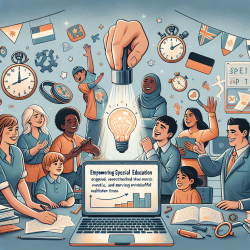Understanding Misreporting in Survey Data: A Pathway to Better Outcomes for Children
As a speech-language pathologist committed to data-driven decisions, understanding the nuances of survey data is crucial. Recent research titled "Misreporting and Econometric Modelling of Zeros in Survey Data on Social Bads: An Application to Cannabis Consumption" by Greene et al. (2018) offers insights that can be applied to our field to enhance the accuracy of data collection and interpretation, ultimately leading to better outcomes for children.
The Challenge of Misreporting
Survey data is a valuable tool for understanding behaviors and outcomes in various fields, including speech-language pathology. However, misreporting—where respondents provide inaccurate information—can significantly skew data interpretation. This is particularly relevant when dealing with sensitive topics, where social stigma or legal repercussions may influence respondents to underreport or misreport their behaviors.
Insights from the Research
The study by Greene et al. (2018) explores the prevalence of misreporting in cannabis consumption surveys, revealing that a significant portion of reported zeros in survey data can be attributed to misreporting. Specifically, the study estimates that 17% of reported zeros are due to misreporting, 11% from infrequent users, and only 72% from true nonparticipants.
These findings highlight the importance of considering misreporting when analyzing survey data. In the context of speech-language pathology, understanding the extent of misreporting can help practitioners make more informed decisions and tailor interventions more effectively.
Applying the Findings to Speech-Language Pathology
Incorporating the insights from this research into speech-language pathology can improve the accuracy of assessments and interventions. Here are a few ways practitioners can apply these findings:
- Enhance Data Collection Methods: Consider the conditions under which data is collected. Ensure that surveys and assessments are conducted in environments that minimize the likelihood of misreporting, such as ensuring privacy and confidentiality.
- Use Econometric Models: Apply econometric models similar to the double-inflated modelling framework used in the study to account for potential misreporting in survey data. This can help in identifying true patterns and behaviors in children’s speech and language development.
- Educate Stakeholders: Raise awareness among parents, teachers, and other stakeholders about the importance of accurate reporting in surveys and assessments. This can help reduce the stigma associated with certain conditions and encourage more truthful responses.
Encouraging Further Research
The study underscores the need for ongoing research into misreporting and its impact on data interpretation. Speech-language pathologists are encouraged to explore further research opportunities in this area, particularly in understanding how misreporting affects the assessment of speech and language disorders in children.
Conclusion
By understanding and addressing misreporting in survey data, speech-language pathologists can make more accurate data-driven decisions, leading to better outcomes for children. The insights from Greene et al.'s research provide a valuable framework for improving data collection and interpretation in our field.
To read the original research paper, please follow this link: Misreporting and econometric modelling of zeros in survey data on social bads: An application to cannabis consumption.










